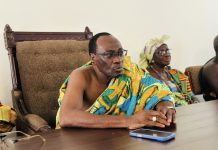Many Ghanaians, including the outspoken Ho West parliamentary aspirant, Lawyer Eric Delanyo Alifo, are laying blame at the doorstep of the Electoral Commission, which has corrected figures of the 2020 polls at least five times after its declaration and subsequent publication on its website.
That has lent credence to the speculation that there were some underhand dealings before the results were declared in favor of President Akufo-Addo.
Judicial power is critical to the consolidation of democracy and the rule of law. Public support is essential for its establishment and maintenance.
According to conventional wisdom, this support is based on apolitical factors rather than who is in political power. We contend, on the other hand, that support may be motivated by instrumental partisan motivations and thus linked to partisan alignment with the executive.
Support for judicial power is widespread, but trust in the courts is low. However, the government of Nana Addo Dankwa Akufo-Addo is believed to be using the powers granted to the judiciary to turn the country into a one-party state.
In a statement dated today, July 19, 2022, the courageous private legal practitioner has advised the Judiciary not to help the government of Nana Addo not to succeed in making the country a one-party state by disenfranchising a large section of Ghanaians with just a Ghana card as a requirement for registration as a voter.
“The plan to create a new register with the Ghana Card as the sole requirement is a simple agenda of the NPP to disenfranchise a large number of citizens in NDC areas, and we do not expect our courts to endorse this diabolic agenda at all, at all, at all.” Part of his statement added.
READ HIS FULL STATEMENT BELOW.
THE JUDICIARY MUST NOT SUPPORT NANA AKUFO ADDO AND THE NPP TO CREATE A ONE-PARTY STATE IN GHANA, PLEASE
Introduction
Most state institutions, particularly, the Electoral Commission (EC) under Mrs. Jean Mensa and the National Identification Authority (NIA) are already pushing this dangerous agenda to keep the NPP in power for a very long time whether or not that is the will of majority of Ghanaians.
Nobody can predict with any reasonable certainty how citizens shall react, and what this shall turn the nation into in the medium to long term if urgent steps are not taken now to stop the NPP in their tracks in using state institutions including security agencies to manipulate national elections in their favour and remain in power against the overwhelming mood of the population.
Connivance of State Institutions
Regrettably, when it is expected that our governments and institutions shall be seen to be striving very hard to give easy and flexible access to more and more of our citizens of 18 years and above to register and vote in all national elections, and to participate otherwise freely without much hustle in the nation’s democratic process, the story was completely different when President Nana Akufo Addo had ascended the presidency, and had sacked the chairperson of the Electoral Commission, and replaced all the top personnel at the election management outfit with people seen as close to his heart to carry out for him and his party, reforms that were largely perceived as empowering eligible voters in the strongholds of the ruling NPP while disenfranchising voters in the strongholds of the opposition NDC.
This was when the EC had decided to change the previous Voters Register, which we were told had given Nana Akufo Addo over one million votes more than John Mahama in the 2016 general elections. This was also at a very huge monetary cost, and in the midst of a global pandemic, COVID 19. In order to limit the number of eligible voters who could have registered, particularly, in the Volta Region and other strongholds of the NDC, the EC had decided—against all reasonable advice, arguments, and caution—to jettison the use of the Ghanaian Birth Certificate as proof of citizenship and rather made the Ghana Card whose issuance had started only a couple of years earlier, and with very large numbers of citizens yet to apply for, or be issued with one the primary requirement for qualification as a voter.
Earlier, there had been a strong perception that the NIA had been working overtime to issue the Ghana Cards in the strongholds of the NPP while making it very difficult for citizens in the strongholds of the NDC to easily acquire the cards.
This was when the judiciary (the Supreme Court in this case) was needed to stand with, and by the people, and make a determination, which must give access to more of our citizens than less of them to register as voters and participate in the electoral process.
Failure of the Judiciary to Stand with the People of Ghana
The simple issue before the Court was whether the EC must accept as the basic requirement to register as a voter, the Ghanaian birth certificate, which every Ghanaian was expected to have by birth, or use the Ghana Card, which was just being issued, with many people yet to acquire them, as the basic requirement for qualification as a voter. Any Court that is interested in giving access to more of citizens to register as voters shall settle on the birth certificate than the Ghana Card in these circumstances. Yet, in the most outrageous decision of our Supreme Court, the Court stood with the EC and NPP administration instead of with the ordinary citizens of Ghana and held that the birth certificate was not a proof of citizenship of Ghana. This decision was a major shock to most Ghanaians, but there was little or nothing anyone could do.
The 2020 general elections itself was arguably one of the most eventful elections in Ghana in recent times. Some people were completely denied the chance to elect a Member of Parliament; the eligibility of others who had already been elected was challenged; people were killed at polling stations during the collation of results; for the first time in the nation’s history, there were multiple errors in the presidential results that were declared; etc. Many challenges were instituted in our courts, and in all of them, the courts stood with the EC and the NPP government against the people that were disenfrachized and the opposition NDC.
In the challenge of the presidential election results when all Ghanaians thought they would have the opportunity to listen to the Chairperson of the EC as she would explain to them how she had done her work, and why there were errors in the results she had declared, the Supreme Court did everything necessary including some bizarre application of technicalities to shield Mrs. Jean Mensa from accounting to the people. It was so disturbing that many of us thought the opposition NDC shall never prevail in any case in our courts, particularly at the Supreme Court, and there was therefore no need for the party to go to the courts with any political matter anymore.
Another Election Cycle: Will the Judiciary Stand with the People this time?
Here we are again, with the 2024 general elections looming large, and we are hearing that the EC wants to create yet another voters register. The rumour is that their expectation that the last register would give a huge advantage to the NPP in the 2020 general elections did not materialize, so in order to push the mantra of “breaking the 8” to reality, they have to create a new register again, and this time, with solely the Ghana Card as the requirement for registration as a voter.
Again, there is a large number of the population that has not yet been issued with the Ghana Card. It is believed that over the last couple of years, much attention was devoted by the NIA to the strongholds of the NPP again, while the areas where the opposition NDC has its supporters have again been mostly starved.
The plan to create a new register with the Ghana Card as the sole requirement is a simple agenda of the NPP to disenfranchise a large number of citizens in NDC areas, and we do not expect our courts to endorse this diabolic agenda at all, at all, at all. Accepting the Ghana Card requirement as the sole basis for qualification as a voter will make sense only if these cards were issued to us many, many years back at birth, or when it can be ascertained that all Ghanaians have been issued with the cards. Even if one Ghanaian citizen remains to be issued with the Ghana Card due to no fault of the person, the Card cannot be a requirement for his or her qualification (his or her right) to vote in Ghana’s national elections.
*Conclusion*
We are watching closely to see how things unfold while we are also very much aware of the risks we assume by expressing views such as in this writeup. Notwithstanding the risks, some of us continue to express these views boldly not because we hate our judiciary and judges. We do it because we believe that our revered judges need the important feedback we are providing them as they do their work.
In a democracy as ours lawyers must not be blacklisted and victimized for speaking courageously about how they think of the decisions of our courts. We must not be punished by merely getting disappointed by judicial decisions, and saying so. We have the right to be disappointed and say it if we like. In order for the image of our judiciary to improve positively, the stakeholders must welcome critical observations and views about their work too. That is what I am doing here and I hope it shall be received very well in all circles.
I rest my case.
Eric ƉELANYO Aliƒo, Esq.











































